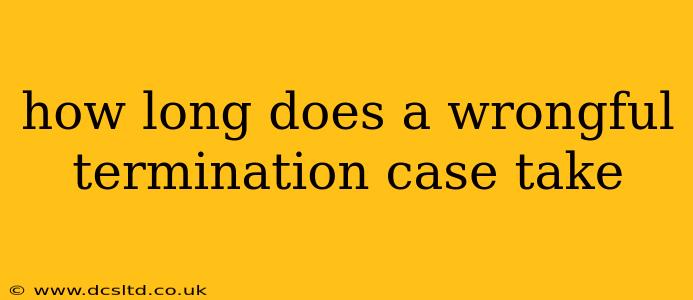How Long Does a Wrongful Termination Case Take?
The length of a wrongful termination case is highly variable and depends on several factors. There's no single answer, as each case is unique and unfolds according to its own circumstances. However, understanding the potential timelines and influencing factors can help you prepare.
Factors Affecting Case Duration:
Several elements significantly influence how long your wrongful termination case might take:
-
Complexity of the Case: Straightforward cases with clear evidence of wrongful termination might resolve quicker than complex cases involving multiple witnesses, extensive documentation, or intricate legal arguments. Cases involving discrimination claims, for example, often take longer due to the need for thorough investigation and evidence gathering.
-
Jurisdiction: State laws vary significantly regarding wrongful termination. Some states have stricter laws or more streamlined processes than others, affecting the overall timeline. The specific court's caseload and the judge's efficiency also play a role.
-
Settlement Negotiations: Many wrongful termination cases resolve through settlement negotiations outside of court. If both parties are willing to compromise, a settlement can be reached relatively quickly. However, if negotiations fail, the case proceeds to litigation, substantially increasing the duration.
-
Discovery Phase: This critical stage involves both sides exchanging information and evidence. It can be lengthy, involving depositions, interrogatories, and document production. The more extensive the discovery process, the longer the case will take.
-
Trial: If the case goes to trial, the duration can vary greatly depending on the complexity of the case, the number of witnesses, and the court's schedule. Trials can last from a few days to several weeks.
-
Appeals: If either party is dissatisfied with the court's ruling, they can appeal the decision. Appeals add significant time to the overall process, potentially delaying final resolution for months or even years.
Common Stages and Timeframes (Approximate):
While these are estimates and can vary significantly, they provide a general idea of potential timelines:
-
Initial Consultation and Claim Filing: This initial phase can range from a few weeks to several months, depending on the complexity of gathering evidence and preparing the necessary documentation.
-
Investigation and Discovery: This stage can take anywhere from several months to a year or more, depending on the amount of information to be exchanged and analyzed.
-
Settlement Negotiations: Negotiations can last for weeks or months, and sometimes even longer if the parties have difficulty reaching an agreement.
-
Trial (if necessary): If the case goes to trial, it can take several months to a year or more from the time the trial date is set until the verdict is rendered.
-
Appeals (if necessary): Appeals can add another year or more to the overall timeline.
How Long Does a Wrongful Termination Case Typically Take?
Many wrongful termination cases resolve within one to two years. However, complex cases can take significantly longer, potentially stretching to three years or more. Some cases may even take longer if appeals are involved.
What Happens If My Case Goes to Trial?
If your case goes to trial, be prepared for a lengthy process involving witness testimony, evidence presentation, and closing arguments. The judge or jury will then deliberate and render a verdict. This phase alone can take several weeks, depending on the complexity of the case.
Can I Get My Job Back?
In some cases, reinstatement to your former position may be a potential remedy. However, this is not always the primary outcome. More frequently, damages such as back pay, lost wages, emotional distress, and attorney fees are sought.
What are My Chances of Winning?
The success of your wrongful termination case depends on various factors, including the strength of your evidence, the applicable laws in your jurisdiction, and the skill of your attorney. Consulting with an experienced employment lawyer is crucial to assess your chances of success and understand your legal options.
It's vital to remember that this information is for general guidance only and does not constitute legal advice. Consulting with an experienced employment lawyer is essential for personalized advice and representation related to your specific circumstances.
